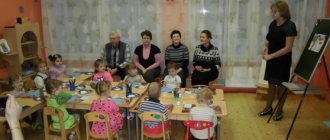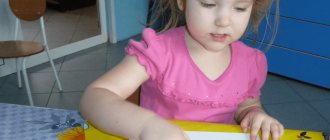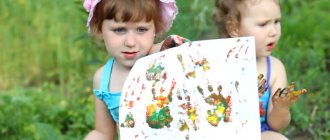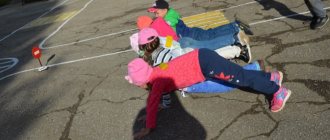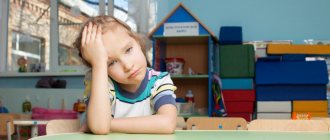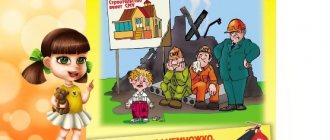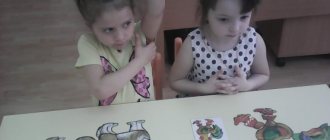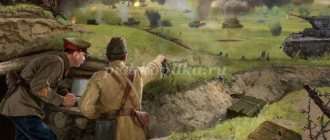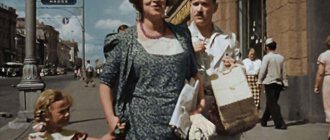Raising children is a complex process. This is an axiom. But finding ways to impart as much knowledge as possible into children, to develop skills and abilities is the same theorem that not only educators, teachers, but also parents of little charges have to prove every day. This work will only be effective if teachers, mothers and fathers act together, which is why so much attention is paid to working with parents in kindergarten. Especially with mothers and fathers of children experiencing another age crisis, namely 3-4-year-old wards of the second youngest group.
- 1.1 How to contact
1.1.1 Video: interactive parent meeting
- 2 Thematic planning, recommendations
2.1 Table: sample thematic plan for parent meetings for the school year
- 2.2 Features of organizing and holding meetings
- 3.1 Table: example of a summary of a parent meeting in the second junior group “That’s what they are, our children!” (fragment)
Goals, objectives and forms of work with parents
The teacher and parents are links in the same chain, interested in the success of the process of raising a child.
This is interesting. “... a preschooler is not a relay race that the family passes into the hands of kindergarten teachers. What is important here is not the principle of parallelism, but the principle of interpenetration of two social institutions..."
Preschool education concept
https://infourok.ru/rabota-s-roditelyami-v-dou-1154849.html
However, in their methodology, mothers and fathers act primarily by inspiration, while teachers act according to science. Combining these methods of influence is an inexhaustible methodological resource. The activities of the kindergarten teaching staff place work with parents as one of the highest priorities.
Communication between teachers and parents is an important aspect of developing a unified strategy for teaching and raising children
The main goal of this work is to find an individual approach to the training, development and upbringing of the child. But, besides this, interaction with family allows you to:
- disseminate useful practical pedagogical knowledge among parents;
- to intensify the family’s attention to the issues of raising the child;
- to form a unified system of requirements for the daily routine and issues of raising a child;
- create a positive image of a preschool children's institution in the minds of parents;
- provide all possible methodological assistance to the family in matters of interaction with three- and four-year-olds;
- obtain as complete information as possible about the child.
To achieve the goals, the teacher solves the following tasks:
- establishing partnerships with the parents of their students by providing emotional support and common interests;
- increasing the psychological and pedagogical awareness of the family;
- support for mothers and fathers in performing their educational and educational functions.
Achieving these goals is possible thanks to the principles on which the relationship between the kindergarten and the family is built:
- parents and educators are equal partners in the education and upbringing of children;
- regular assistance to the child, trust and respect are guaranteed from both parents and teachers;
- constant monitoring of interaction between family and kindergarten, analysis of results at all stages of this work.
How can I contact
The more diverse the methods of working with parents, the easier it is to find an approach to each family - this is a rule that every educator should remember when drawing up a plan for interaction with mothers and fathers of preschoolers for the year.
The forms of work can be as follows:
- Questioning and interviewing in order to identify the characteristics of family upbringing traditions and the reasons for certain deviations in the child’s behavior. They also allow us to draw a conclusion about the socio-material and cultural level of the family.
- Testing of pedagogical competence. A method for identifying gaps in parents' pedagogical knowledge.
- Joint leisure. Sports events (for example, the "Mom, Dad, Me - Sports Family" competition), quizzes, etc.
Solving riddles together is an excellent way to organize leisure time for parents and children.
- Conversations, round table discussions. Option to determine the appropriate way to resolve conflict situations. For example, if there are children in a group who constantly fight with each other. And also a way to establish feedback, as parents can ask questions that interest them.
- A pedagogical “living room”, the essence of which is to appeal to the authoritative opinions of professionals (for example, outstanding teachers, psychologists, which is especially valuable for raising children during the 3-year-old crisis).
- Workshops. For example, a business game, the purpose of which is to analyze the results of the creative activity of adults and children (for example, discussing the results of a psychological test of a child’s personality “Drawing of my family”).
Creating a group collage helps parents understand how their children feel in a group
- Family reading library. Creation and updating of a list of psychological and pedagogical literature aimed at improving mutual understanding in the family.
- Consultations, helpline. Personal communication with parents regarding the individual educational routes of their children.
- Joint actions. For example, the spring event “Feed the Birds”, the goal of which is to make bird feeders (with the hands of parents) and regularly replenish food supplies (with the efforts of the kids). As well as the creation of photo newspapers, wall newspapers, participation in competitions, etc.
- Open house or interactive parent meetings. Creating the opportunity to monitor the child in the process of his interaction with other children and the teacher, as well as the integration of adults into the preschool environment.
Thanks to a wide range of forms of interaction with families, educators have the opportunity to diversify their work with parents.
Video: interactive parent meeting
Table: long-term plan for working with parents of the second younger group (fragment)
| Month | Form of interaction | Subject |
| September | Organizational parent meeting | “Teaching objectives, features of development and education of children in the second junior group.” |
| Consultation | "Crisis of 3 years" | |
| Drawing up a family passport to collect information about parents and family upbringing | ||
| Conversation | “How to teach a child to say hello” | |
| Consultations | “How to properly organize your daily routine” | |
| Joint leisure (participation in the All-Russian competition of children's drawings) | "Let's relax and create" | |
| October | Conversation | “Why it is necessary to vaccinate against influenza and ARVI” |
| Consultation | “Your child doesn’t speak?” | |
| Conversation | “Sports uniform and shoes for physical education” | |
| Consultation | "On the dangers of lack of sleep" | |
| Consultation | “If a child often throws tantrums” | |
| February | Conversation | “Children’s “I want” and parental indulgence” |
| Joint leisure (photo newspaper) | “The best dad is mine” | |
| Joint physical education fun | “The best dad is mine” | |
| Consultation | "If a child fights" | |
| Conversation | “Labor education of a child in the family” | |
| Consultations for parents with children with speech development problems | "Speech development" | |
| View an open GCD lesson | "Development of children's constructive abilities" | |
| Participation in the All-Russian Children's Drawing Competition | "RUSSIAN RAILWAYS" | |
| Participation of dads in a musical matinee | "Dad, I am a future soldier" |
Plan of work with parents in the second junior group according to the Federal State Educational Standard for the year
Long-term plan for working with parents of children in the younger group
Description of the material: I bring to your attention a long-term plan for working with parents of children in the younger group. This material will help plan work with parents throughout the school year. September
1. Visual – textual information “Crisis of 3 years”.
2. Photo exhibition “Summer days”. 3. Consultation: “Daily routine and its importance in a child’s life.” 4. Parent meeting “Tasks of education and training for the school year.” 5. Consultation “We are pedestrians.” 6. Individual conversations with parents “Child’s adaptation to kindergarten. How to help a child fall in love with kindergarten? 7. Memo “Children are happiness” 8. Memo for parents “Creating a favorable atmosphere in the family” October
1. Consultation “Features of development of children 3-4 years old.”
2. Consultation “The importance of play activities in the development of children 4 years of age.” 3. Memo “Do not leave children at home alone.” 4. Exhibition of crafts made from natural materials “Gifts of Autumn”. 6. Conversation “Dressing for the weather.” 7. Memo “What to do if a child bites?” 8. Consultation “Growing up healthy” 9. Consultation “Whims and stubbornness” 10. Individual conversations with parents about the need to get vaccinated against influenza. November
1. Consultation “How to behave with strangers?”
2. Making a sliding folder “What can we already do?” 3. Consultation “What fairy tales should we read to children?” 4. Conversation “What should be in a children’s locker in kindergarten?” 5. Memo “If a child experiences fears” 6. Consultation “Active play in a child’s life” 7. Master class “Crafts from salt dough” 8. Memo for parents “How to develop interest in handicrafts?” 9. Photo exhibition “Family leisure” 10. Consultation “Why do children break toys?” December
1. Conversation “How not to get sick?”
2. Memo “Why you shouldn’t punish children?” 3. Consultation “Talk to your child correctly.” 4. New Year's party for children and their parents. 5. Folder – moving “Sensory development of children”. 6. Master class “Garlic as a means of fighting colds” 7. Parent meeting “Speech of a younger preschooler.” 8. Consultation “What to do when a child cries?” January
1. Exhibition of crafts and souvenirs “New Year’s Beauty”.
2. Memo for parents “The art of being a parent.” 3. Design of a thematic information stand “Safety Rules”. 4. Consultation “How to spend a day off with your child?” 5. Folder - moving “Let's play with the whole family.” 6. Consultation “How to understand your own child?” 7. Memo “Hardening is the path to health” 8. Consultation “If a child shows aggression” February
1. Consultation “The influence of the psychological microclimate of the family on the health of the child.”
2. Practical advice “The importance of daily routine for raising children.” 3. Memo "Outdoor games for children 3-4 years old." 4. Conversation “Bad habits of children.” 5. Master class “Gift for Dad.” 6. Consultation “How to teach a child to put away toys?” 7. Parent meeting “Game in the life of a preschooler.” March
1. Design of the information stand “Child’s health and computer.”
2. Wall newspaper “Our mothers are the best” 3. Memo “Developing motor skills. Games with clothespins." 4. Photo exhibition “Walking is great!” 5. Making greeting cards for mothers and grandmothers. 6. Holiday “Our Grandmothers and Mothers”. 7. Consultation “Can a child be punished?” 8 Consultation “By playing, we train attention and develop memory” April
1. A selection of photographic materials on the topic “Funny moments.”
2. Visual – textual information “Read to the children.” 3. Exhibition of children's creativity “Spring has come!” 4. Folder – movement “First Aid”. 5. To the parent’s piggy bank “What a 3-4 year old child should know.” 6. Consultation “Cleanliness is the key to health.” May
1. Folder: “Prevention of intestinal diseases.” 2. Mobile folder: “Echo of War.” 3. Photo exhibition “From the life of our group.” 4. Consultation “On vacation with a child.” 5. Tips: “If the child has a poor appetite.” 6. Parent meeting “The success of our group for the year!” 7. Consultation “Safety measures on the street in the summer”
We recommend watching:
Calendar - thematic planning in the second junior group for December Calendar - thematic planning in the second junior group for November Long-term plan for working with parents in the second junior group Educational program of additional education of artistic and aesthetic orientation for
Similar articles:
Planning classes on FEMP in the second junior group according to the Federal State Educational Standard for a year
Thematic planning, recommendations
A parent meeting is a means of communication between the teaching staff and the child’s immediate environment, allowing you to implement the tasks of all forms of interaction, combining them within one time period. As a rule, meetings in the second junior group are held 4 times a year:
- at the beginning of the school year (September);
- before the end of the calendar year (December);
- spring (February-early March);
- at the end of the school year (late May-early June).
Table: sample thematic plan for parent meetings for the school year
| № | Meeting topic | the date of the | Form of conduct | Responsible for carrying out |
| 1 | “This is what they are, our children! Physical development of 3 year old children" | conversation | group teachers | |
| 2 | “Cultivating independence in children of primary preschool age” | round table | group teachers, nurse, psychologist | |
| 3 | "Children play - let's play together" | round table, discussion | group teachers | |
| 4 | “We can do a lot, we can do a lot!” | business game, parent committee meeting | group teachers, head |
Features of organizing and holding meetings
Drawing up a plan for an event and its implementation requires the teacher not only and not so much to convey his theoretical and practical knowledge, but to demonstrate the abilities of a speaker capable of influencing the public. Therefore, in order to successfully cope with such a task, it is necessary to take into account a number of rules.
- Strict timing. On average an hour (plus or minus 15 minutes). The parent meeting is held in the evening, where moms and dads usually come right after work. So there is no point in delaying the collection. Tired parents simply will not be able to perceive all the information that the teacher wants to convey to them.
- Selection of material. Since there is not much time, the information must be carefully sorted. Many dedicated teachers strive to convey as much interesting knowledge as possible to moms and dads, completely disregarding the fact that some specific theoretical things are of interest only to a narrow circle of people.
- Emotional mood. Whatever your day, whatever manifestations come from the audience, the teacher-speaker must be positively charged himself and convey this mood to those around him.
Photos of children doing something useful on their own or with their mothers will help create a positive atmosphere at the beginning of the meeting.
- Individual approach. Children are different, but parents are also different. So if one mother calmly reacts if the teacher asks to take action due to the fact that her son bites, then the other will create a scandal and demand not to get personal. In this case, there is one trick: praise publicly, scold in person. That is, it is imperative to talk about successes in front of everyone, and postpone any deviant moments until a personal conversation. Or specify them in an impersonal form.
Plan of interaction with parents in the second junior group.
Plan of interaction with parents in the second junior group.
September.
1. Joint preparation for the school year.
The goal is to direct parents to actively, jointly and pedagogically correct work to ensure a good adaptation of children to the new group and teachers.
2. Parent meeting “Self-care in a child’s life”
The goal is to familiarize parents with the plan of educational work with children for the year, discuss the recommendations and recommendations of the parent committee.
3. Photo exhibition “Let's get to know each other” with a story about the family
The goal is to learn about the families of the students, their interests, activities, and get to know each other.
October.
1. “Day of Good Deeds” (joint production of bird feeders by children and parents)
The goal is to involve parents in the environmental education of their children and work together.
2. Consultation “Fulfilling the wishes of children, parents and teachers”
The goal is to set parents up for fruitful joint interaction, following the rules of the group.
3. Photo report “Sharing family experience”
The goal is to share the experience of successful moments in raising a family.
4. Exhibition of joint drawings by children and parents “We Draw”
The goal is to involve parents in joint visual activities at home.
November
1. Joint preparation of the group for winter
The goal is to involve parents in preparing the group for the cold and preventing morbidity.
2. Photo report “Playing at home”
The goal is to find out what educational games children play at home, and to involve parents in jointly creating photo reports with their children.
3. Consultation workshop “The role of didactic games in the family and in kindergarten”
The goal is to give parents knowledge about the importance of educational games, their meaning, and familiarization with the card index of didactic games.
4. Project “Smart Games”
The goal is to develop in children and parents the interest and ability to play educational board games.
December
1. Photo message “Movement is life”
The goal is to introduce children and parents to a healthy lifestyle, active recreation, and sports.
2. Crafts competition “Magic snowflakes”
The goal is to involve children and parents in the joint activity of making New Year's crafts and to promote family unity.
3. Joint holiday “Hello winter, winter!”
The goal is to get positive emotions from the holiday, satisfaction from participation, and promote family unity.
January.
1. Day of Good Deeds “Snow Buildings”
The goal is to organize joint activities to decorate the site with winter buildings.
2. Wall newspaper “Winter Walk”
The goal is to provide information about walks in kindergarten, events and activities during walks, outdoor games, to cultivate a desire to be active with children, to spend time outside.
3. Parent meeting “Formation of elementary mathematical concepts in younger preschoolers
The goal is to provide knowledge about the importance of developing mathematical abilities in children of primary preschool age, to develop the interest of parents in solving issues of joint development of children.
February.
1. Exhibition of children's drawings “Home Sketches”
The goal is to continue to involve parents in joint artistic activities at home, to intensify the joint creativity of children and parents.
2. Photo newspaper “My dad, the best”
The goal is to attract mothers and children to the design of the exhibition - congratulations on Defender of the Fatherland Day, to cultivate a desire to give gifts, and to show creativity.
3. Consultation “Fizkultprivet”
The goal is to attract parents to a healthy lifestyle, physical education, exercise with sports equipment, and encourage active participation in improving the health of children.
March.
1. Photo newspaper “My beloved Mommy!”
The goal is to involve fathers and children in the design of the exhibition - congratulations on Defender of the Fatherland Day, to cultivate a desire to give gifts, and to show creativity.
2. Joint spring holiday
The goal is to get positive emotions from the holiday, satisfaction from participation, and promote family unity.
3. Parent meeting “Little Brawlers”
The goal is to teach parents to correctly respond to quarrels, disputes, fights of children, to teach them to resolve conflicts, and to cultivate a desire to peacefully find a way out of their problematic situations.
4. Campaign “We are for the environment”
The goal is to cultivate a caring attitude towards the environment and a desire to protect nature.
April
1. Exhibition of children's works “Spring has come and called the birds”
The goal is to involve parents in joint activities at home with their children, to deepen their children’s knowledge about birds.
2. Birthday Day
The goal is to develop communication skills in children and parents, promote positive emotions, and cultivate a desire to actively participate in joint activities.
3. Day of Good Deeds “Takeaway Material”
The goal is to attract parents to equip them with play materials during walks, to cultivate a desire to participate and be creative.
4. Self-Government Day
The goal is to involve parents in raising children and teach how to manage a children's team.
May.
1. Exhibition for Victory Day
The goal is to attract parents to participate in the day of remembrance of participants in the Great Patriotic War.
2. Parent meeting “Successes of our group”
The goal is to provide information about the children’s successes at the end of the year and talk about summer recreational work.
3. Consultation “Walks and their meaning”
The goal is to provide knowledge about the importance of outdoor activities, parental participation in games, and to cultivate interest in the child’s needs.
4. Preparing the area for summer walks
The goal is to involve parents in preparing the group site for summer recreational work.
Documentary support of the meeting
The above-mentioned oratory for the teacher begins with drawing up a detailed note of the gathering of mothers and fathers. The event consists of 4 stages.
- Greeting – up to 3 minutes.
- The main part (consists of 3 information blocks, which are discussed together with parents: theory, practice, conclusion) – up to 35 minutes.
- Organizational issues (discussion of upcoming excursions, replenishment of the group fund and/or garden, etc.) – up to 20 minutes.
- The final stage is up to 2 minutes.
At the second stage we will dwell in more detail. The essence of meetings with parents is to convey psychological and pedagogical information, which is fundamentally important for effective interaction with children. Therefore, the teacher, preparing for the meeting, makes a brief overview of the theory on a specific issue, then illustrates it with practice, preferably from the life of his group, discusses the presented facts with parents and formulates conclusions. It is very important not to dive too deeply into theory. The ratio of theory and practice should be 1:2.5.
You can invite a kindergarten nurse, psychologist or speech therapist to the parent meeting
Table: example of a summary of a parent meeting in the second junior group “That’s what they are, our children!” (fragment)
| Author | Anna Ulitina, teacher of the Slobodsky kindergarten "Gingerbread House" for general development | |
| Stage | Block | Content |
| Greetings | Good evening, dear parents! We are glad to see you at our parent meeting. Today we will talk with you about the age characteristics of children 3–4 years old, the program we work on, and will solve some organizational issues. I would like to draw your attention to how different we all are, but you can always find something that unites us. For example, today we are united by the fact that today we have gathered to talk about our children. | |
| Main part | Theory | I would like to start our meeting with the issue of changes in the development of independence of our children. Independence is a valuable quality necessary in a person’s life. It should be raised from early childhood. Children very often strive to perform various actions on their own, actively imitating adults. And it is very important for us, adults, to support them in this. Often, in response to an offer of help, we have to hear “I myself!” (Reading the poem by O. Zaretskaya “About independence”)...> |
| Practice | <…Discussion with parents. What have they learned and can do independently at their age? • Wash your hands by rolling up your sleeves; wash your face without splashing water; use soap correctly; do not wet clothes; dry yourself with a towel, hang it in the designated place without being reminded. • Dress and undress in a certain sequence: take off clothes, fold them, hang them, turn them right side out; put on clothes, unfasten buttons, fasten them, tie shoelaces. • Notice a mess in your clothes and fix it yourself or seek help from an adult. • Use a handkerchief and toilet in a timely manner. • Drink from a cup; eat, chewing food well, with your mouth closed. • Use a spoon, fork, and napkin correctly. • Put away toys, books, building materials in a certain place...> | |
| Conclusion | <…“Our children are our old age. Proper upbringing is our happy old age, bad upbringing is our future grief, these are our tears, this is our guilt before other people” (Anton Semenovich Makarenko). | |
| Organizational aspects | Choice of parent committee, miscellaneous. | |
| Quote from: https://www.maam.ru/detskijsad/roditelskoe-sobranie-vo-2-mladshei-grupe-tema-vot-oni-kakie-nashi-deti.html | ||
Long-term plan for working with parents in the nursery group for the 2018-2019 academic year
Long-term plan for working with parents
in the nursery group
for the 2018-2019 academic year
August
1. Consultation “How to prepare a child for kindergarten.”
2. Folder “Daily routine for children 2-3 years old.”
3. Folder-moving “Traffic rules. Ensuring the safe life and activities of children."
4. Consultation “Age characteristics of children 2-3 years old.”
5. Conversation “Adaptation of children in kindergarten.”
6. Consultation “Health is the head of everything.”
September1. Conversation “Self-care in a child’s life.”2. Consultation “Educational games for children 2-3 years old.”3. Conversation “The importance of walking for children’s health.”4. Parent meeting “Let’s get to know each other.” October 1. Photo exhibition “Autumn Fun”. 2. Mobile folder “Mama Yasam!”3. Consultation “The importance of games and activities with objects and tools in the development of children of the third year of life.”4. Consultation “Live vitamins in the prevention of colds.”5. Holiday "Golden Autumn". November 1. Memo “Formation of cognitive activity in children 2-3 years old.”2. Folder “Theater is our friend and helper.”3. Consultation “Whims and stubbornness.”4. Conversation “Teaching a child safety rules.”5. Mother's Day holiday.December1. Consultation “Flu. Prevention measures. Symptoms of this disease.”2. Folder “Sensory development”.3. Conversation “The role of nursery rhymes in the development of a child’s speech.”4. Consultation “What to do when a child cries?”5. Folder “Bad behavior in a child after kindergarten.”6. Holiday "New Year Tree".January1. Conversation “What is good and what is bad. How to explain this to a child?”2. Consultation “Do we understand each other?”3. Consultation “What toys are needed for children 2-3 years old.”4. Photo exhibition “Winter Fun”. February 1. Consultation “How to help a child speak.”2. Consultation “What should a child read before bed?” 3. Photo newspaper “Me and Dad.” 4. Conversation “What does it mean to be a good father?” March 1. Folder “How to develop a child’s memory?”2. Conversation “What can my child do?”3. Photo newspaper “Me and Mom.”5. Consultation “Why read books to children?”6. Holiday "March 8". April1. Consultation “How to rid a child of a bad habit?”2. Conversation “Children's safety at home.”3. Consultation “If a child bites.”4. Folder “Three Years Crisis”.5. Folder “Games for fidgets.” May 1. Consultation “How to communicate with children correctly.” 2. Folder “Learning colors is simple and fun.”3. Conversation “Rules of conduct during emergencies.”4. Consultation “Rules of behavior with insects.”5. Conversation “Punishment and reward.”6. Photo exhibition “We have grown up”. June
1.Consultation “Traffic rules. Features of safe behavior in the summer."
2. Conversation “How to teach a child to dress independently.”
3. Folder “Games with sand and water”.
4. Consultation “what to do if you are bitten?”
